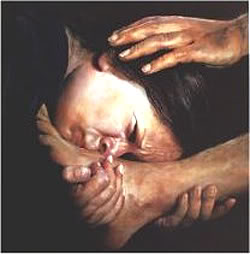Central Idea: God gladly forgives the sins of the contrite of heart. Doctrine: Contrition. Practical Application: Daily examination of conscience.
To view Lectionary 93, click here.
2 Sm 12:7-10, 13, PS 32:1-2, 5, 7, 11, Gal 2:16, 19-21, LK 7:36-50
- St. Paul reminds us we are to avoid evil and do good.
- But we have something wrong with us—the Church names it Original Sin—which keeps inclining us to sin.
- The drama of our lives is the battle between our aspirations to do good and the pull of sin. We need the graces Christ won for us and offers us, especially through the Sacraments.
- Out of lust for her beauty, King David committed adultery with Bathsheba, the wife of his most loyal soldier Uriah, and got her pregnant. David tried various means of covering up his sin and when they failed he found a way to get Uriah killed in battle. When the prophet Nathan helped the king come to his senses, King David declared, “I have sinned against the LORD.”
- As Christ reclined at the banquet, the woman washed his feet with her tears, dried them with her hair, and anointed them with perfumed oil.
- Taken together, the “sinful” woman and King David make a perfect model of contrition. David made a naked confession, “I have sinned against the LORD.” She showed sorrow for her condition with her tears. Neither said a word on his or her own behalf. No excuses. No elaborate explanations. No blaming others.
- We the Baptized live “in Christ.” That is, with his grace we try to do good and avoid evil, not to save ourselves or justify ourselves, but because that is what children of God should do.
- When a person sincerely asks God to forgive his sins, God forgives. David confessed his sin to God. God took away the guilt of his sin. David was freed and rejoiced. No doubt so was the woman.
- And when we fail, we turn in sorrow to our good God who readily forgives us. He has even given us a Sacrament for that, Penance.
Doctrine: Contrition
- The Sacrament of Reconciliation’s fundamental structure “comprises two equally essential elements: on the one hand, the acts of the man who undergoes conversion through the action of the Holy Spirit: namely, contrition, confession, and satisfaction; on the other, God’s action through the intervention of the Church” (CCC 1448).
- Here we will focus on one of the acts of the individual: contrition.
- Contrition is “sorrow of the soul and detestation for the sin committed, together with the resolution not to sin again.” (CCC 1451) We saw the deep sorrow in the woman who washed Christ’s feet.
- In regard to the resolution not to sin again, the idea some have that Catholics think you can go out and do whatever you want, and then confess it, and then go out and do it again, is insane. There must be a real resolution to not do it again.
- The Church recognizes two kinds of contrition. Perfect contrition arises out of loving God above all else. “Such contrition remits venial sins; it also obtains forgiveness of mortal sins if it includes the firm resolution to have recourse to sacramental confession as soon as possible” (CCC 1452).
- Imperfect contrition is also a gift of grace and is “born of the consideration of sin’s ugliness or the fear of eternal damnation and the other penalties threatening the sinner.” This sorrow is not perfect because it grows out of fear. Still it is a good thing because it “can initiate an interior process which, under the prompting of grace, will be brought to completion by sacramental absolution.” With imperfect contrition, the grave sin is not forgiven before sacramental absolution. (CCC 1453)
- If you feel guilty when you do wrong, consider yourself fortunate, because your conscience and heart are working properly. That guilt is there to lead you to contrition.
Practical Application: Daily examination of conscience
- The Catechism tells us we ought to prepare for the Sacrament of Reconciliation by “an examination of conscience made in light of the Word of God” (CCC 1454)
- A practical tool that Christians have discovered to improve in their moral lives is the examination of conscience, not simply before going to Confession but every day.
- At the end of the day, but not so late that you are nodding off asleep, you have a dialogue with Our Lord about how your day has gone. There are many ways of doing this self-evaluation. One simple method is to ask yourself these three questions:
- What went well today? This will elicit gratitude in you.
- What went badly today? This should result in contrition.
- What could I do better tomorrow? This gives you the basis for a practical resolution.
- The examination of conscience is a way to help you improve, rather than to stay in the same place or even to deteriorate.
- The daily examination should end with an act of contrition, either a formal one like you learned as a child or in your own words.
- If you make a few cryptic notes about the things that went badly, you may begin to see the patterns of your own behavior that might be perfectly obvious to others but invisible to you. You also will have done most of the work of preparing for a good Confession.

Leave a Reply